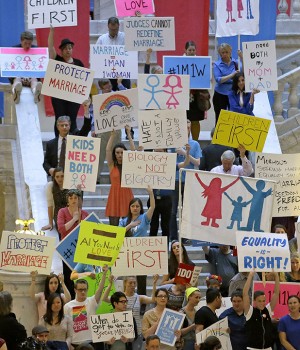
Associated Press
By Kalli Damschen
Staff Writer
Several debates across the country have ensued as the Supreme Court hears one of the most controversial Supreme Court cases in the history of the court. A group of cases collectively called Obergefell v. Hodges that questions whether same-sex marriage is a constitutional right, could potentially require all states to license same-sex marriages.
Same-sex couples are legally allowed to marry in 37 states and the District of Columbia. The cases in Obergefell v. Hodges arose from Kentucky, Michigan, Ohio and Tennessee, four of the remaining 13 states where same-sex marriage is illegal.
Brad Toben, who is the dean of the Baylor School of Law and is the M.C. and Mattie Caston Chair of Law, said in an email to the Lariat that there are two questions before the court.
Toben said the questions focus on whether the 14th Amendment requires states to license a marriage between two people of the same sex or recognize a marriage between two people of the same sex lawfully married in another state.
“If the Court decides the first question in the affirmative, the second question becomes moot,” Toben said. “In other words, if the court holds that the right of same-sex couples to marry is constitutionally protected, then same-sex marriage will be allowed nationwide.”
If the Supreme Court decides that the Constitution does not require a state to license same-sex marriages, the Court will have to address the second question to determine whether states must recognize same-sex marriages that occurred legally in other states.
The question of gay marriage has been divisive across the country, all the way from Washington, D.C., to Waco.
In Baylor’s student policies and procedures, the university welcomes all students into a safe and supportive environment where they can learn and discuss a variety of issues, including human sexuality. The university affirms the biblical norm of marriage between a man and a woman.
Baylor students have a wide variety of opinions on the matter, however.
One of the primary Republican arguments against same-sex marriage is that marriage is a religious institution and a traditional union between one man and one woman for the purpose of procreation, said Little Rock, Ark., sophomore Sara Grove, the president of Baylor College Republicans.
“I believe that the definition of marriage is between a man and a woman,” Grove said.
Baylor College Republicans is a student organization that aims to foster the conservative ideals of the Republican party through Baylor students.
Allen senior Rebecca Holden said she disagrees with this definition of marriage.
Holden is the president of the Sexual Identity Forum, an unofficial student group that meets once a week to discuss issues related to sexual and gender identity.
“What marriage means has changed many times over the course of centuries,” Holden said. “What marriage means in our society now is not something exclusive to procreation or heterosexual couples. That official legal status and social recognition should be extended to same-sex couples as well.”
Holden said the purpose of the forum is provide a safe place for student in the LGBT community, questioning or just interested in learning more about sexual and gender identity.
While SIF is not a political or activist organization and is also not sanctioned by the university, Holden personally supports the legalization of same-sex marriage.
Another conservative concern is that expanding the definition of marriage to include same-sex marriage might eventually lead to further changes in the way society values marriage, said Frisco sophomore Emily Martin.
“I think we have societally tended to make marriage really arbitrary,” Martin said. “Due to divorce culture, marriage is some sort of idea of achieving happiness for both parties. It’s more of a contractual kind of thing that’s easily broken off. To me, I see marriage as something that is very distinct and sacred.”
Martin worries that expanding the definition of marriage to include same-sex couples could eventually lead to the acceptance of currently taboo relationships, such as polygamy and incest.
Katy sophomore Taylor Phillips, a SIF member, said she hopes the Supreme Court will rule that marriage is a constitutional right for same-sex couples. Phillips said the definition of marriage as a union between a man and a woman is a religious issue, so same-sex marriage should be legalized because of the separation of church and state.
“The issue I have with people making religious arguments against it is that lots of different religions practice marriage, and people who do not identify with a particular religion can still get married,” Phillips said. “Trying to make marriage a religious institution doesn’t make sense. I believe it should be secular.”
Other Baylor students question whether the Supreme Court should be responsible for making the decision. Grove said many conservatives think states should be allowed to determine for themselves whether marriage is strictly between a man and a woman.
“A lot of people think it should be the right of states to decide,” Grove said. “Obviously, a lot of people think that it shouldn’t be legalized at all. Most conservatives believe that marriage is between a man and a woman.”
Another conservative argument raised before the Supreme Court is that same-sex marriage is a relatively new institution in modern countries. Only 18 countries have legalized same-sex marriage nationwide. The Netherlands was the first country to do so in 2001. Since same-sex marriage is relatively new, some conservatives argue that it’s impossible to know how legalizing same-sex marriage will impact society in the long run.
Liberals, on the other hand, argue that no one is harmed by same-sex marriage and so it should not be banned.
“Trying to stop gay marriage is like saying that people aren’t allowed to love other people,” Phillips said. “Why would you stop something that has no effect on you?”
The Court is still in the process of hearing oral arguments, but will have reached a decision by the end of June when the court’s term ends.



